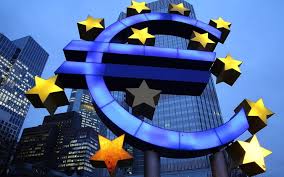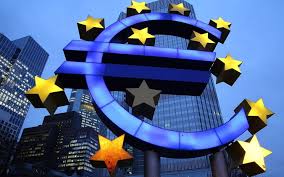
Allying fears that were expressed by analysts and market watchers months back, data from the European statistical office shows that the euro zone has continued growing at a moderate pace in the third quarter of this year.
Compared to the figure in the second quarter of this year, there was a very marginal rise of 0.3 percent in the growth in GDP (gross domestic product) for the euro area in the last three months. Analyst expectations in a Reuters poll were met by the figures and the initial reading. On a year-on-year basis, the 19-member economy saw growth of 1.6 percent.
A rise in October in the inflation figures was seen in the data that released at the same time. Up from 0.4 percent in September, Flash Inflation figures hit 0.5 percent last. The figure of inflation narrowly missed expectations of a 0.6 percent rise and the main inflation driver was the services sector according to official estimates.
"The preliminary flash estimate of euro-zone (third quarter) GDPsupports the message from earlier country data that the pace of growth remains slow," Jennifer McKeown, chief European economist at Capital Economics, said in a note after the data release.
Mixed economic activity across the 19-member bloc was evident in the data released last week. The purchasing managers' index in Germany went up to 55.1 in October from 52.8 in September. But with French PMI falling to its lowest figure in two months at 52.2, the figures were less optimistic in France.
Although business investment could be limited due to several political uncertainties in the near future domestic demand should support growth in the euro zone, according to IHS Markit.
"We expect overall euro zone GDP growth to come in at 1.6 percent in 2016. However, we have concerns about euro zone growth prospects in 2017. Indeed, we suspect that euro zone GDP growth could ease back to 1.4 percent in 2017 as it is likely to be increasingly hampered by political uncertainties," Howard Archer, chief European economist at IHS Markit, said in a research note.
However while core inflation remained subdued at 0.8 percent on the year, the flash inflation figures were in line with market expectations. Inflation is likely to "move sharply higher" in the next few months as energy-base effects "really kick in," believes Frederik Ducrozet, senior Europe economist at Pictet Wealth Management.
In the euro zone, inflation has slowly started to pick up again and since the euro zone sovereign debt crisis, growth has remained fragile in the region despite five years passing. The European Central Bank iterated at its last meeting that the quantitative easing policy would be unchanged as the bloc continues to prop up the economy with its quantitative easing. Additionally, its asset purchase program, due to expire in March of next year, has been given no indication that it would be started to be tapered.
(Source:www.cnbc.com)
Compared to the figure in the second quarter of this year, there was a very marginal rise of 0.3 percent in the growth in GDP (gross domestic product) for the euro area in the last three months. Analyst expectations in a Reuters poll were met by the figures and the initial reading. On a year-on-year basis, the 19-member economy saw growth of 1.6 percent.
A rise in October in the inflation figures was seen in the data that released at the same time. Up from 0.4 percent in September, Flash Inflation figures hit 0.5 percent last. The figure of inflation narrowly missed expectations of a 0.6 percent rise and the main inflation driver was the services sector according to official estimates.
"The preliminary flash estimate of euro-zone (third quarter) GDPsupports the message from earlier country data that the pace of growth remains slow," Jennifer McKeown, chief European economist at Capital Economics, said in a note after the data release.
Mixed economic activity across the 19-member bloc was evident in the data released last week. The purchasing managers' index in Germany went up to 55.1 in October from 52.8 in September. But with French PMI falling to its lowest figure in two months at 52.2, the figures were less optimistic in France.
Although business investment could be limited due to several political uncertainties in the near future domestic demand should support growth in the euro zone, according to IHS Markit.
"We expect overall euro zone GDP growth to come in at 1.6 percent in 2016. However, we have concerns about euro zone growth prospects in 2017. Indeed, we suspect that euro zone GDP growth could ease back to 1.4 percent in 2017 as it is likely to be increasingly hampered by political uncertainties," Howard Archer, chief European economist at IHS Markit, said in a research note.
However while core inflation remained subdued at 0.8 percent on the year, the flash inflation figures were in line with market expectations. Inflation is likely to "move sharply higher" in the next few months as energy-base effects "really kick in," believes Frederik Ducrozet, senior Europe economist at Pictet Wealth Management.
In the euro zone, inflation has slowly started to pick up again and since the euro zone sovereign debt crisis, growth has remained fragile in the region despite five years passing. The European Central Bank iterated at its last meeting that the quantitative easing policy would be unchanged as the bloc continues to prop up the economy with its quantitative easing. Additionally, its asset purchase program, due to expire in March of next year, has been given no indication that it would be started to be tapered.
(Source:www.cnbc.com)





